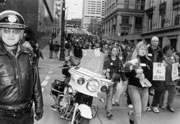Sean Ewan, 23, and his four friends from Strung Out in the Northwest set their open violin case on the cobblestones at their feet. Unaware a crowd was headed their way, they unfurled five yo-yos and got them swinging and jumping shortly before 2pm. “We don’t do it for the money,” said Ewan, who calls himself the spokesman for Strung Out, which is a Bremerton yo-yo club. “The violin case, it’s there if people want to donate something, but we just like to perform.”
A few steps away, in the middle of Yesler Way, Pioneer Square, a young man named Kristopher Kime had died two weeks earlier. He was mortally beaten by other young men on Fat Tuesday, a crowded celebration that became a riot by youthful drunks and hoodlums. Most visible on the major TV networks were black youths, attacking in teams. In a few minutes now, a thousand marchers led by black community leaders would arrive here to hold a Sunday prayer vigil for the white boy who was killed trying to help someone else. The vigil’s intent was to heal racial tension and remind us not to give up on the young.
And here already was some reassurance—Ewan and his teenage buddies, walking the dog with yo-yos, being kids.
“Oh, that’s what this is about,” said Ewan, pointing to a nearby TV van, “the guy in the riot. That was a shame.”
The marchers, just arriving, thought so too. They came down the hill behind a police motorcycle escort, children and teens of all colors marching silently with politicians and parents and community leaders, flooding the cobblestone park at First and Yesler.
“People often forget how hard it is to be a teenager,” said Robin DeCook, a teen herself. She and others held daffodils to place in the street, now cordoned off, where Kime was attacked. His mother and grandparents, brothers, sisters, aunts, uncles, cousins stood in the back, crying, shoulders shaking. They heard Reverend Anthony Robinson of Plymouth Congregational urge an undecided city not to “strike back or run [or] to say the hell with the welfare of the city.” They heard a parent, Clinton Metcalf, say, “We repent for being absent from our children’s daily lives,” and another parent, Phyllis Daniels, say our kids “live in a world we have made.”
They heard, too, from Reverend Leslie Braxton of Mount Zion Baptist, who got the politicians in the crowd—among them Mayor Paul Schell, County Council members Larry Gossett and Greg Nickles, and City Council member Jim Compton—to step up and bow their heads for good news and bad: “Let us not elect them to make them hostages in hard times,” Braxton cautioned listeners, but, “Dear Lord, we pray that You give them Your wisdom.”
The vigil was tender and stirring, also indirect: It did not answer angry feelings about racism in a city that usually prefers not to talk about it. Were blacks and Asians attacking whites in Pioneer Square because of their color? Were whites blaming black gangs for the violence because that’s the stereotype? These are among the questions nagging a city that got most of its information from videotape.
Fortunately the relatively small number of black attacks on whites are now being balanced out by other videos, like those on public access cable where blacks fight blacks, a black man saves a white beating victim, and delighted white kids turn over a car in the street, break windows, and marvel at the great violence surrounding them.
The city is shocked about Mardi Gras, but is it surprised that—whatever color the drinker—beer and testosterone mix even worse in a mob?
These were not questions for the vigil. But Kime’s mother, Kimberly Kime-Parks, had a good recommendation Sunday. “Take your frustration and your anger and use it for something positive,” she said. Then she was on her knees in the street as the crowd, the mayor, the police chief, and the hundreds of others came up and piled flowers two feet high on the asphalt memorial to her son, who lived to be 20. Reverend Samuel McKinney said to her, “May the blood that is here today rise up and redeem us all.”
A light rain fell and the crowd thinned. The Strung Outs packed up their yo-yos and headed north. “Probably to Seattle Center,” Sean Ewan said. “Again, not for the money. Show him.” One of the yo-yo boys displayed his T-shirt. “Will Work for String,” it said. They laughed. Kids.








